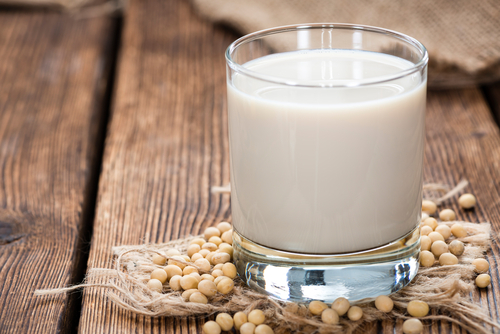Short answer
Soy milk is safe for you to drink, despite what you may have heard.
Recommended Alternative
Long answer
Soy milk is a popular form of concentrated soy protein. It's a popular alternative for vegans and lactose-intolerant folks who still want to enjoy a bowl of cereal. Soy milk gets a bad rap, however; you may have heard that it'll disrupt your hormone levels, cause cancer, or weaken your bones. Some of this is lazy misinterpretation of science, and some is deliberate distortion.
Much of the misinformation on soy has been spread by the Weston A. Price Foundation. It's an organization founded in memory of a 20th-century dentist by the same name who traveled the world looking for a relationship between non-western diets and dental health. He concluded that sweeteners, preservatives, and other novel ingredients were at the root of a whole range of health problems in the west - not least of all problems with dental health.
The foundation founded in his memory takes a more extreme stance. They're hardline advocates for a diet that's high in meat and raw milk and outspoken critics of vegetarian diets and non-meat proteins source of protein like soy. This is a fringe position that's actively dangerous - prominent WAPF board member and advocate Stephen A. Byrnes, who spent his life promoting the health benefits of red meat discrediting the associated risk to heart health disease, died from a massive stroke at age 42. Their criticisms of soy, nonetheless, have taken root.
Central to their criticisms is that soy contains phytoestrogens - plant hormones structurally similar to estrogen. WAPF claims that phytoestrogens can interfere with the thyroid and the reproductive system, lower sperm counts and cause men to grow breasts, and disrupt development in fetuses and infants.
This claim has been thoroughly investigated and disproved several times over. Evidence for hormonal disruption comes mostly from studies where phytoestrogens were injected directly into the bloodstreams of rodents. That's relatively weak evidence - we know that phytoestrogens behave very differently in different species of mammals, and multiple studies have come up with almost nothing to show that soy disrupts fertility, development or hormones in humans.
There's slightly stronger evidence for concern in fetal and infant populations. We know that phytoestrogens can enter their blood during pregnancy or through the substitution of soy milk for breastfeeding where allergies or lactose intolerance are present. So far, however, half a century of studies have not shown that exposure to phytoestrogens during pregnancy or infancy causes developmental or reproductive problems later in life. Out of an abundance of caution, most doctors recommend against soy during pregnancy or infancy except where allergies are present.
What we do know is that the mechanism of action for phytoestrogens is complicated and context-dependent - sometimes they amplify the effect of estrogen, sometimes they don't, and sometimes they reduce or block it. Any source that makes simple, declarative claims about the dangers of phytoestrogen without taking this complexity into account should make you suspicious.
There's a growing body of evidence that soy milk has a protective effect against certain cancers, such as prostate cancer. Soy proponents claim this is because of nutrients in the soy itself - there's been some research that indicates it has a direct antioxidant effect. More skeptical researchers temper these claims, saying that more research is needed, but acknowledge that a soy-heavy diet still reduces cancer risk by replacing carcinogenic sources of protein like red meat.
Soy also seems to be good for heart health. It reduces bad cholesterol and raises good cholesterol; as with prostate cancer, it often replaces foods in the diet that clog your arteries and drive up the risk of heart disease. Soy is also an excellent source of omega-3 fatty acids, which you need in your diet for a healthy heart (provided that they're consumed in the right ratio with omega-6 foods).
Another outlandish claim made by the Weston A. Price Foundation is that soy blocks the absorption of important minerals and can increase your risk of bone fractures or osteoporosis as a result. This is the opposite of what the research tells us. Phytoestrogens seem to guard against osteoporosis, not cause it. Soy isn't naturally high in calcium, but many soy products, including soy milk, are marketed with added calcium, which contributes to bone health.
A good deal of soy milk comes from soy that's been genetically modified so that it can be sprayed down with the weedkiller Roundup. There's no evidence so far that GMO soy is dangerous to your health. There are problems associated with GMOs, however. Their use furthers the consolidation of agriculture into the hands of a few wealthy corporations. They encourage the indiscriminate use of Roundup - which, according to a white paper put out by the World Health Organization, might be carcinogenic. GMO soy creates the temptation for monoculture, which has a host of associated problems.
Possible short-term side effects
- allergic reaction
Ingredients to be aware of

Benefits
- reduces risk of certain types of cancer
- may have antioxidant effects
- promotes heart health
- reduces bad cholesterol
- increased good cholesterol
- contributes to bone health
Our Wellness Pick (what is this?)
Silk Organic Soy Milk
- Dairy-free alternative
- Unsweetened formula
- Vegan-friendly
- Non-GMO Verified
- Shelf-stable convenience
 Approved by
Approved by 















